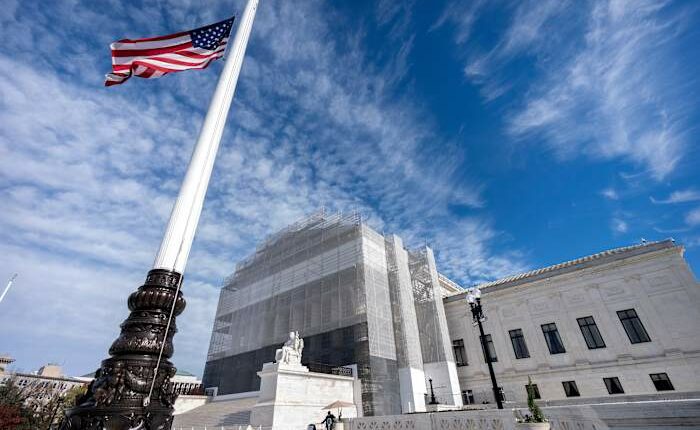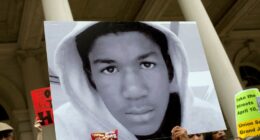Share this @internewscast.com

WASHINGTON – In a private meeting slated for Friday, the Supreme Court is set to deliberate on a significant matter that has captured national attention: President Donald Trump’s executive order concerning birthright citizenship. This order asserts that children born in the United States to parents who are either undocumented or temporarily residing in the country do not automatically qualify as American citizens.
The justices may announce as early as Monday whether they will consider Trump’s appeal against the lower court decisions that have consistently invalidated these citizenship restrictions. Notably, these restrictions have not been enforced anywhere in the nation thus far.
Should the Supreme Court decide to engage with the case now, proceedings would likely unfold in the spring, with a final decision anticipated by early summer. This executive order, which Trump enacted on the very first day of his second presidential term, represents a key component of his administration’s aggressive stance on immigration policy. Other related measures include intensified immigration enforcement in various cities and the unprecedented peacetime use of the 18th-century Alien Enemies Act.
The administration’s immigration policies are facing numerous legal challenges, with the Supreme Court offering varied responses through emergency orders. For instance, the justices have halted the application of the Alien Enemies Act to swiftly deport alleged Venezuelan gang members without judicial hearings. Conversely, they have permitted the continuation of widespread immigration checks in Los Angeles, after a lower court had previously prohibited stopping individuals based solely on race, language, occupation, or location.
Additionally, the Supreme Court is considering an urgent appeal from the administration seeking approval to deploy National Guard troops in Chicago for immigration enforcement. This deployment has been stalled indefinitely by a lower court ruling.
The justices also are weighing the administration’s emergency appeal to be allowed to deploy National Guard troops in the Chicago area for immigration enforcement actions. A lower court has indefinitely prevented the deployment.
Birthright citizenship is the first Trump immigration-related policy to reach the court for a final ruling. Trump’s order would upend more than 125 years of understanding that the Constitution’s 14th Amendment confers citizenship on everyone born on American soil, with narrow exceptions for the children of foreign diplomats and those born to a foreign occupying force.
In a series of decisions, lower courts have struck down the executive order as unconstitutional, or likely so, even after a Supreme Court ruling in late June that limited judges’ use of nationwide injunctions.
While the Supreme Court curbed the use of nationwide injunctions, it did not rule out other court orders that could have nationwide effects, including in class-action lawsuits and those brought by states. The justices did not decide at that time whether the underlying citizenship order is constitutional.
But every lower court that has looked at the issue has concluded that Trump’s order violates or most likely violates the 14th Amendment, which was intended to ensure that Black people, including former slaves, had citizenship.
The administration is appealing two cases.
The U.S. Court of Appeals for the 9th Circuit in San Francisco ruled in July that a group of states that sued over the order needed a nationwide injunction to prevent the problems that would be caused by birthright citizenship being in effect in some states and not others.
Also in July, a federal judge in New Hampshire blocked the citizenship order in a class-action lawsuit including all children who would be affected.
The American Civil Liberties Union, leading the legal team in the New Hampshire case, urged the court to reject the appeal because the administration’s “arguments are so flimsy,” ACLU lawyer Cody Wofsy said. “But if the court decides to hear the case, we’re more than ready to take Trump on and win.”
Birthright citizenship automatically makes anyone born in the United States an American citizen, including children born to mothers who are in the country illegally, under long-standing rules. The right was enshrined soon after the Civil War in the first sentence of the 14th Amendment.
The administration has asserted that children of noncitizens are not “subject to the jurisdiction” of the United States and therefore not entitled to citizenship.
“The lower court’s decisions invalidated a policy of prime importance to the president and his administration in a manner that undermines our border security,” Solicitor General D. John Sauer wrote in urging the high court’s review. “Those decisions confer, without lawful justification, the privilege of American citizenship on hundreds of thousands of unqualified people.”
Copyright 2025 The Associated Press. All rights reserved. This material may not be published, broadcast, rewritten or redistributed without permission.












